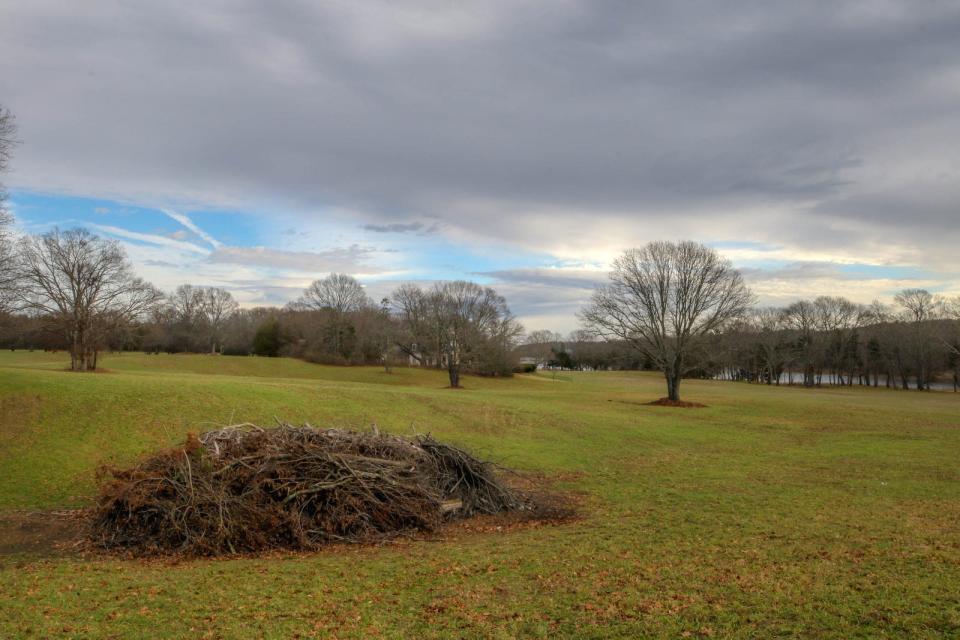Advocates want open space funding in new green bond. McKee's office says it conflicts with housing.
- Oops!Something went wrong.Please try again later.
PROVIDENCE – Environmental advocates came out in force this week urging lawmakers to devote funding to open space and farmland preservation in the green-economy bond that would go before voters in November.
“We have a responsibility to future generations to continue to fund these conservation efforts,” state Rep. Megan Cotter, a Hopkinton Democrat, said at a House Finance Committee hearing.
Over the last four decades, nearly every environmental bond on the ballot included money for open space or farmland acquisition. The last time funding was omitted for either program was 2008.
But the $50-million green bond proposed as part of Gov. Dan McKee’s spending plan includes no money for land-preservation programs.

While there are funds left over from previous bond approvals, including $2.6 million for land acquisition by cities and towns, $400,000 for farmland preservation and $2.1 million for the state open-space program, much of the money is already spoken for, according to DEM director Terry Gray.
So Cotter introduced legislation that would put an additional $16 million in the bond proposal to purchase undeveloped land, acquire conservation easements for farmland and manage existing state open space. It’s the same amount of money the DEM asked the governor for when the administration was putting together the spending plan last summer.
Cotter’s bill is supported by a broad coalition that includes conservation groups, farming organizations, land trusts, advocates of local food and hunters.
“When we’re investing in open space and access to open space, we’re investing in the people of this state,” said Jeanine Silversmith, executive director of the Rhode Island Environmental Education Association.
McKee administration concerned open space conflicts with housing
McKee’s office has previously said that the budget proposal omitted funding for open space and farmland acquisition because the administration wanted to limit the total amount of borrowing across a number of bond questions.
At the hearing and under questioning by Rep. Teresa Tanzi, Brian Daniels, director of the Office of Management and Budget, gave another explanation. He told the committee that the administration wanted to rethink how open space is protected so that preservation efforts don’t interfere with the state’s acute need for more housing.
“We are the smallest state, which means the competition for scarce land is intense between conservation and housing, renewable energy and economic development,” he said. “Unfortunately, one of the ways that we’ve done open space in the past is it’s really an either/or proposition.”
When Tanzi asked why the largest amount of money – $20 million – was going to the Quonset Business Park in support of offshore wind development, Daniels said it’s because renewable-energy investments are key to reaching the state’s decarbonization goals.
Cotter said protecting forests and other undeveloped areas is also important to meet the mandates set by the state’s landmark climate law because they store carbon.
“The $16 million will help us get to the goals set by the Act on Climate,” she said.
More: Cultivating success: RI's new farmers help the state buck national trends
Land preservation key to farming
Advocates say the funding for farmland protection is of particular importance. The state lost nearly 10% of its farmland between 2017 and 2022, the most recent year accounted for in the federal Census of Agriculture.
While there have been positive signs for the industry in Rhode Island – growth in the overall value of products sold and an influx of beginning farmers – there’s strong incentive for farm owners to sell. At $17,500 an acre, Rhode Island has the most expensive farmland in the nation.
Since 1985, the state program to acquire development rights to agricultural land has protected 129 farms, covering 8,200 acres.
Andrew Morley said that when he and his wife were looking to set up a small dairy farm 13 years ago, the biggest challenge was finding land. They eventually signed a long-term lease for a property in Little Compton that had been protected by the farmland preservation program in 1990 and created Sweet and Salty Farm.
“So we were given the opportunity to start a farm in a place because of land conservation in the past,” Morley said.
And if the land hadn’t been protected?
“It would probably be very large mansions, empty most of the year except for summer, like a lot of Little Compton is,” he said.
This article originally appeared on The Providence Journal: Conservation vs. housing clash in push to get open space funding in green bond

